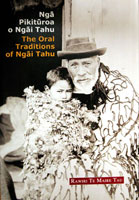Moki was a warrior who helped the expansion of Ngāi Tahu into Banks Peninsula and Canterbury and met an untimely end after a curse was laid on him.
Moki was the youngest son of Tūāhuriri from his wife Hinetewai. He was known as the warrior of the family as his older brother Hāmua died young and Tūrakautahi, his middle brother, had a club foot and therefore did not lead his people in warfare.
Ngāi Tahu expands south
Moki’s story is set in Te Waipounamu during the period of expansion by Ngāi Tahu to lands further south. Having secured their dominance over Ngāti Māmoe in the Kaikōura area, the chiefs including Moki and Tūrakautahi were ready to spread into Canterbury.
Kaiapu and Tamakino (survivors of battles further south in Southland) and brothers to Moki’s wife Mārewa; brought news that the Canterbury lands were only lightly inhabited and that Tūtekawa could be found at his lakeside pā of Waikākahi.
Distribution of lands and resources of Banks Peninsula
Moki extended his protection to the brothers and the next day they met with the chiefs to discuss what they had seen. It is said that at this meeting that the lands and resources of Banks Peninsula were distributed amongst these chiefs.
To Te Rakiwhakaputa, went the land and resources of Whakaraupō (Lyttelton). To Makō, brother of Marukaitātea (Maru) went Ōhiri (Little River) and Wairewa (Lake Forsyth). And finally to Te Ruahikihiki, son of Manawaiwaho went Kaitōrete and Waihora (Lake Ellesmere).
Moki departing in his waka taua Makawhiu (the desolater) and with his expeditionary force set off in pursuit of Tūtekawa, the old adversary of his father Tūāhuriri.
Along the way Moki and his taua (warriors) overcame a number of small settlements including Parakākāriki Pā at Ōtanerito. Attacking overland Tūtekawa was found in his whare. His demise at the hands of Whākuku brother of Tūāhuriri’s slain wives brought to a conclusion this tale that had started far away in Wellington many years ago.
Expansion into Canterbury
Once matters had been concluded with Tūtekawa, Ngāi Tūhaitara migrated from Kaikōura to Canterbury. As described above the principal chiefs claimed the lands where their descendents still live today. In addition another chief Huikai established himself at Koukourarata and his son Tautahi at the site of Christchurch - Ōtautahi.
Moki returned to Kaikōura and encouraged his brother Tūrakautahi to go south where he eventually constructing a pā at Taerutu Lagoon (near Woodend) which was given the name Te Kōhaka-a-kaikai-a-waro later to be known as Kaiapoi.
An untimely ending
Once established in Canterbury a number of expeditions to the territory of Ngāti Wairaki on the west coast took place. Tūrakautahi barely escaped from one with his life. Tānetiki the older brother of Tūrakautahi and Moki, would be lost on another expedition along with their relatives Tūtaemaro and Tūtepiriraki. Hikatūtae (their uncle) survived and chopped off the head of his nephew Tānetiki and returned him to his family at Kaikōura.
So the people turned to Moki to exact revenge upon Ngāti Wairaki with the aid of Makō from Wairewa. This he did and on his return to Kaikōura he was being honoured for the victory, when he made a derogatory remark about some women. The women took offence at the slight and sought the help of two tohunga (shaman) named Iriraki and Tautini, who laid a curse on him. He was dead in three days.
Knowing that his time was short he called for his uncle Hikatūtae to bury him at Kaiapoi. His final words were:
E ta, Hikatūtae, e mate au. Ka mau i au ki Pekapeka ki reira takoto kia mārama ai aku whatu ki taku umu tangata.
(Translation – My friend, Hikatūtae, I am dying. Take me to Pekapeka and lay me there so that I may look upon my ovens of human flesh, my fields of conquest.
)
The funeral party stopped near Waipara overnight and the body left a mark which was named Te Mimi-o-Moki-parawaka now known as Ōmihi (North Canterbury). It is said that Moki was buried at a place known as Kaitukutuku (near Waikūkū flaxmill) thus bringing to an end his warrior adventures.
 Sources
Sources
- Te Maire Tau and Atholl Anderson editors. Ngāi Tahu A Migration History, Bridget William Books, 2008
- Rawiri Te Maire Tau. Nga Pikitūroa o Ngāi Tahu The Oral Traditions of Ngāi Tahu. University of Otago Press, 2003
- Told by Teone Taare Tikao to Herries Beattie. Tikao Talks. Cadsonbury Publications Christchurch, 2004
